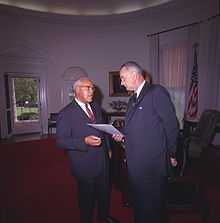Frederick D. Patterson

Frederick Douglass Patterson (October 10, 1901 – April 26, 1988), born in Washington D.C. and orphaned at the age of two. Patterson would later become president of what is now Tuskegee University (1935–1953) and founder of the United Negro College Fund (1944, UNCF). In 1987, President Ronald Reagan awarded Dr. Patterson the Presidential Medal of Freedom, the nation’s highest civilian honor. In 1988, he was awarded the Spingarn Medal from the NAACP.[1]
Early life
Frederick Douglass Patterson was born on October 10, 1901 in Washington, D.C. to Mamie Lucille and William Ross Patterson. He was named after the great abolitionist and D.C. resident Frederick Douglass. Douglass was orphaned by the age of 2 when both of his parents died from tuberculosis. He then moved in with his sister Bessie who quickly enrolled him in the elementary school of Samuel Huston College (currently Huston-Tillotson College) where his affinity for education quickly shined through.
Path to Academic Excellence
By the age of 31, Patterson had attained three educational degrees: a Doctorate of Veterinary Medicine and Master of Science from Iowa State, and a Doctorate of Philosophy from Cornell University. His journey to academic accomplishment was not without its roadblocks. He was the only African American working at the Iowa State College veterinary clinic, where he learned important personal lessons about race and society.[2]
In his autobiography, reflecting on the experience, he writes, “I learned a lesson with regard to race that I never forgot: how people feel about you reflects the way you permit yourself to be treated. If you permit yourself to be treated differently, you are condemned to an unequal relationship.” The same year Patterson received his Doctorate from Iowa State College in 1923, Jack Trice, the College's first African American student athlete, died from injuries sustained in a football game.
Patterson taught veterinary medicine for four years at Virginia State College while serving as the Director of Agriculture. From there, he became head of the veterinary division, then the director of the School of Agriculture at the Tuskegee Institute.[3]
In 1935, at the young age of 33, he had distinguished himself enough to be named the third President of Tuskegee Institute
Professional career
At Tuskegee Institute, President Patterson (1935-1953) was responsible for transforming the Institute into a full-fledged university with graduate programs that exist to this day. Over the course of his Presidency he founded the School of Veterinary Medicine, the Commercial Dietetics program, and spearheaded the University's engineering and commercial aviation programs. All of these programs uniquely situated African Americans and Tuskegee University in a position where they could provide highly skilled interns for prestigious internships in emerging fields.
Legacy of Leadership
In 1944 founded two institutions which would largely shape his overall legacy: the School of Veterinary Medicine at Tuskegee University which has graduated approximately 75 percent of the United States' black veterinarians, and the United Negro College Fund (UNCF) which administers 37 private historically black colleges and universities throughout the United States and administers 10,000 scholarships every year. Today, UNCF has raised over $3.6 billion since its inception in 1944.
Dr. Patterson's leadership won him national recognition and earned him an invitation to serve on President Harry S. Truman's President's Commission on Higher Education from 1946-47. This commission called for an important shift in American college education away from European concepts, and towards equality of opportunity. Important developments flowing historically from this Commission's report were the development of the community college network and the Title III of the Higher Education Act of 1965.
Dr. Patterson eventually became a director of the Phelps-Stokes Fund from 1958-1969 where he worked to improve education for youth of all disadvantaged backgrounds. He also founded the nonprofit Robert R. Moton Memorial Institute to improve the recruitment and management processes of HBCUs.
Eventually, Dr. Patterson would receive the Presidential Medal of Freedom from President Ronald Reagan on June 23, 1987 in recognition of his lifetime of leadership and success in the educational field.
Enduring Legacy
In honor of the profound impact Dr. Patterson had on college education, especially in the African American community, UNCF established the Frederick D. Patterson Research Institute (FDPRI) in 1996. FDPRI is the nation's foremost research institution regarding educational issues facing African American from preschool to adulthood. Headquartered in Washington, DC within UNCF headquarters close to Howard University in the Shaw neighborhood of DC, the legacy of Dr. Frederick D. Patterson continues to live on.
Patterson is a member of Alpha Phi Alpha fraternity.
References
- Goodson, Martia Graham. Chronicles of Faith: The Autobiography of Frederick D. Patterson. Birmingham, Ala.: University of Alabama Press, 2002. ISBN 0-8173-1196-3